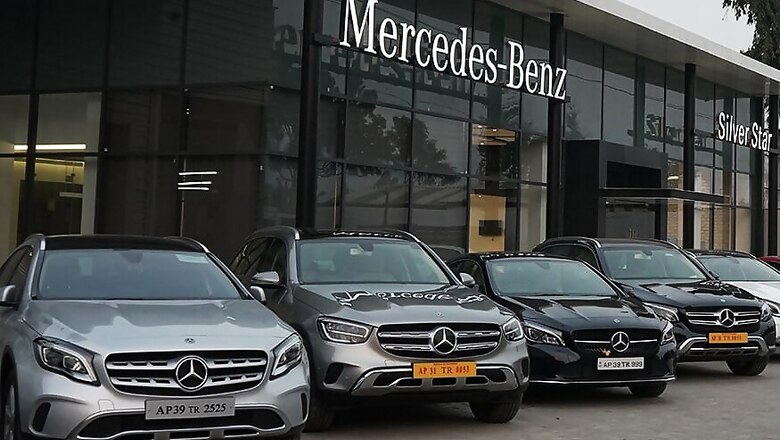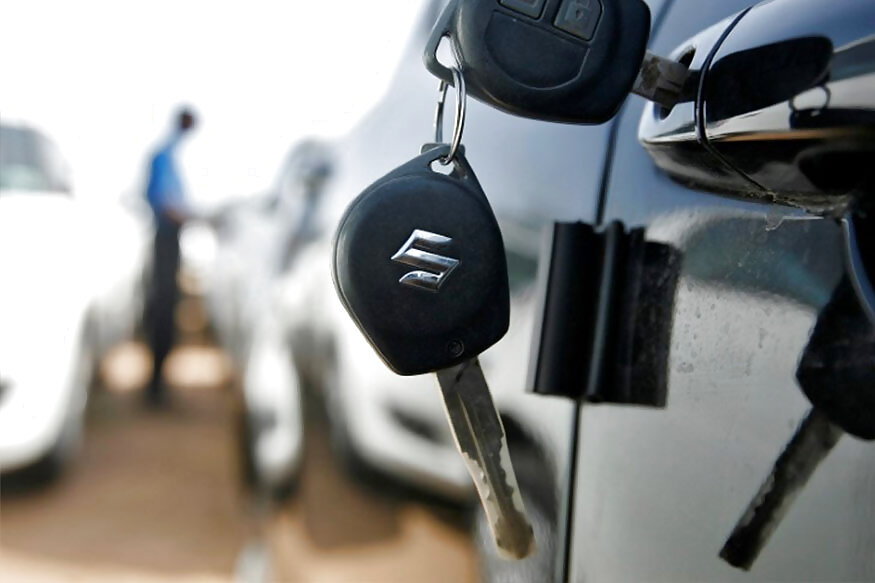
views
Leasing a car, or “subscribing” to it is a relatively new phenomenon as compared to financing a car which has been pretty much the norm up until now. We are seeing the rise in popularity of the leasing model internationally in more developed markets so does that mean that it is time for us to adapt to it as well in the coming future? And what is the car leasing service anyway and how does it work? What are the pros and cons and the conditions required to be able to lease a car in the first place? And the big question – what are the advantages of leasing a car as opposed to financing one? We answer all those questions for you.
But before we get to that we need to understand the current situation of the Indian automotive industry in order to get a perspective as to where it is headed. And for that, we need to take a look at some sales numbers.
The story of the Indian automotive industry has not been a pleasant one for more than a year now. With sales plummeting continuously since late 2018, the Coronavirus pandemic could not have come at a worse time.
It was the Diwali festival season last year which was supposed to kick the auto sales chart towards a rather unfamiliar upwards direction, unfortunately, that wasn’t going to happen. Post that, it was supposed to be the turn of the calendar, the New Year, which was going to make things better. It was said that people wanted to get their hands on new 2020 manufactured vehicles and those who had not yet purchased a vehicle, were just waiting for discounts on the 2019 stock to come out.
The discounts came, but the buyers did not.
Also Watch:
Passenger vehicle sales continued to see a year-on-year (YoY) decline in January 2020, 6 per cent to be specific. In February, it was down once again, by 7.61 per cent for domestic passenger vehicle sales, as per the data by the Society of Indian Automobile Manufacturers (SIAM).
In December, the sales were down by 1.24 per cent and in November, the sales were down by 3.43 per cent. This means, that for the four months before March, there has been a year-on-year decline. The only green that the industry saw was in the month before that, in October 2019, when the sales were up by a mere 0.28 per cent – which was just 804 more units sold by the entire domestic passenger vehicle industry across the country.
Before that, the sales had plunged 24 per cent in September - and this was the 11th consecutive month of declining sales.
So in short, it had been a woeful 16 months for the Indian automotive industry. The only thing scarier at this point was what March would turn out to be like as it was the month where automakers had to suspend sales due to the Coronavirus lockdown. And it was worse than expected.
German automaker Volkswagen reported a sales decline of 95 per cent after selling just 131 units last month as compared to 2,751 units sold in March 2019. India’s biggest automaker Maruti Suzuki was down 47 per cent. In fact, except Maruti Suzuki, Toyota and Hyundai (all reported a sales decline of over 40 per cent), every automaker selling passenger cars in India reported a sales decline of over 50 per cent as compared to the sales they clocked in March 2019.

Then, there’s the fact that the BS-VI emission norm came into place from April 1, 2020. And with that, there was about Rs 7,500 crore worth of inventory of BS-IV vehicles that had not been sold.
Out of that, scooters and motorcycles make up for about Rs 4,000-4,500 crore, Commercial Vehicles are worth Rs 2,500-3000 crore and cars and utility vehicles are of about Rs 800-1000 crore.
This means, that not only automakers are in the middle of a big financial impact, but their dealer networks are going through it too.
Amongst the two-wheeler manufacturers in India, Hero MotoCorp is set to be most impacted from this transition as it is said to have the biggest concentration of BS-IV stocks.
By now, you get the idea. And this is only the tip of the iceberg as to how much of an impact the Indian automotive industry has been bearing for almost a year and a half and how grim the situation right now is.
The question, then, becomes that what’s next? Well, one of the things that the international and developed automotive markets are now mulling over is whether it is time to have the vehicle leasing model take over big time. And it’s not something that is new in India as automakers like Hyundai, Skoda, Fiat and Mahindra already have their car leasing/subscription services functioning in India.
The monthly lease rental plans for Skoda cars starts at Rs 19,856 per month, for Mahindra cars it starts at Rs 13,499 per month and for Hyundai, it starts from Rs 7,673 per month.
But how does leasing a car work and what are the pros and cons of it? Well, in simple words, leasing a car saves you the hassles of ownership, car maintenance, repairs, breakdown assistance, and insurance in exchange for a monthly subscription to a company via your choice of vehicle, for a fixed period of time.
Let’s explain it taking the example of Hyundai and answer some of the questions that you might have.
WHAT IT THE ELIGIBILITY CRITERIA FOR LEASING A CAR?
Hyundai says salaried employee, self-employed professionals and small and medium enterprises (SMEs) can avail the leasing service.
IN WHICH CITIES CAN YOU LEASE THE CAR?
Hyundai Leasing is currently available across Delhi NCR, Mumbai, Chennai, Hyderabad and Bengaluru in the first phase. This will be later rolled out to other cities too.
WHAT IS THE MINIMUM TENURE OF LEASING THE CAR?
The leased vehicle will be available for a minimum period of two years going up to five years, depending on the city and model selected.
HOW IS THE LEASE RENTAL CALCULATED?
Hyundai says that the customer does not have to pay the entire value of the car. Instead, they have to pay the usage value of it. Hence, the final lease rental depends on the mileage and the duration of the leasing contract and the additional services that you opt for.
HOW MUCH ARE THE LEASE RENTALS?
Mentioned below are the monthly lease rentals for base variants of car models chosen for a tenure of five years in Delhi. These rentals are inclusive of GST, but insurance and other maintenance service cost are extra.
-Hyundai Santro 1.1 Era (P) - Rs 7,673
-Hyundai Grand i10 1.2 Era (P) - Rs 8,936
-Hyundai Elite i20 1.2 Era (P) - Rs 9,813
-Hyundai Verna 1.4 E(P) - Rs 15,488
-Hyundai Creta 1.4 Diesel E+ - Rs 17,642
CAN YOU CHOOSE A PARTICULAR VARIANT OF THE CAR YOU WANT TO LEASE?
Hyundai says the customer can choose from any vehicle, variant and colour, as long as it is in line with your eligibility criteria.
WHAT IS THE PROCESS OF RETURNING THE CAR AT THE END OF THE CONTRACT?
When a lease contract expires, the company says that the leased vehicle must be returned to Hyundai Leasing usually at the location where the vehicle was originally collected at the inception of the contract. Hyundai Leasing will inspect the vehicle to ensure that it is returned with all documentation and standard accessories like a duplicate key, owner’s manual, warranty book, original RC card and ensure that the vehicle is in a ‘standard condition’ which is defined as a vehicle that has been subjected to normal wear and tear considering its age and mileage.
With that being said, it is not all flowery when it comes to leasing a car. For example, every leasing service has a kilometre cap per month and if you cross that mark, you will have to spend even more per kilometre. You also cannot install accessories on your leased car until unless you take an approval from the company and if during the installation process there is some damage to the vehicle, you might have to bear that cost. If you had taken the vehicle for a particular time period and decide to return it before the said term ends, you will have to pay a penalty.

On the other hand, if you purchase a car, you will have to pay for the RTO registration, insurance policies and maintenance and service charges which go up as your car gets older. This will be on top of the EMI that you will be paying after dropping a chunk of change in the form of a down payment for the vehicle in the first place. And once your car is old and you wish to sell it off, you also have to go through that process of finding a good bid for your vehicle and also take care of the fact that the owner has been transferred.
And this is where the subscription model’s biggest downside comes to light – once the subscription is over, you return the car back to the company and get nothing in return for your own self. Whereas, if you purchase a vehicle and sell it off, it does leave you with some money in hand which can be used as an investment for your next vehicle.
So by now, you get the bigger picture. There is no “right” or “wrong” between the two options and there are specific cases where both of them make sense.
The only difference is that, as of now, the number of cases that make sense for financing a car far outweighs the cases where leasing a car would be recommended. But given how big of an impact the recent year and a half has had on the automotive industry and the fact that we are yet to see how the Coronavirus pandemic paves the way for the future, it won’t be wrong to expect companies tweaking their existing subscription models in order to make them more lucrative and being joined by new players in the coming future. This would inevitably give rise to competition and that only means one thing – it will be advantageous for the end consumer.
To sum it up, financing a car is definitely the better path towards car ownership as of now, but will it be the same in the future? That, we have to wait and see.
Also Watch:


















Comments
0 comment